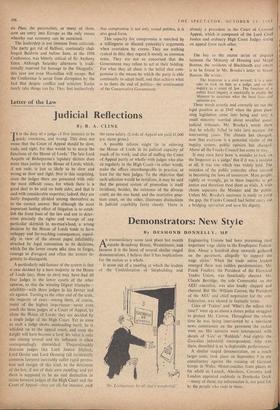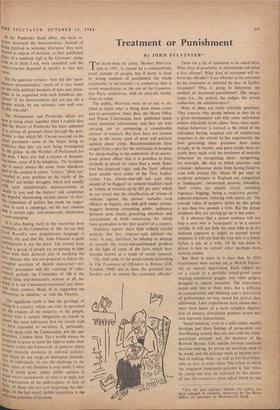Demonstrators: New Style By DESMOND DONNELLY, MP A extraordinary scene took
place last month outside Broadway House, Westminster, and because it is the latest of several similar staged demonstrations, I believe that it has implications for the nation as a whole.
It arose out of a meeting at which the leaders of the Confederation of Shipbuilding and
'Dr. Livingstone, by all that's wonderful.'
Engineering Unions had been presenting their important wage claim to the Employers' Federa- tion. About a hundred shop stewards gathered on the pavement, allegedly 'to support the wage claim.' When the trade union leaders emerged there was sudden pandemonium. Ntr. Frank Foulkes, the President of the Electrical Trades Union, was fanatically cheered. Mr. Claude Berridge, the sole Communist on the AEU executive, was also loudly clapped and cheered. But Mr. William Carron, the President of the AEU and chief negotiator for the con- federation, was abused in fantastic terms.
Cries of 'Traitor' and 'What's the sellout this time?' went up as about a dozen police struggled to protect Mr. Carron. Throughout the whole time he was being interviewed by a television news cameraman on the pavement the racket went on. His answers were interspersed with shouts of 'Lies' or 'Rubbish.' And rightly the Guardian industrial correspondent, who was there, described it as 'a deplorable performance.'
A similar staged demonstration, on a much larger scale, took place on September 9 jn my constituency against the training of German troops in Wales. Motor-coaches from places as far afield as Lanark, Aberdeen, Coventry and London appeared suddenly in Pembroke Dock —many of them, my information is, not paid for by the people who rode in them. In the Pembroke Dock affair, the local re- action dismayed the demonstrators. Instead of being received as welcome liberators' they were treated as objects of derision; so their publicised Plans of a weekend vigil at the Germans' camp, Such as at Holy Loch, were cancelled, and the motor-coaches departed as quickly as they had come.
Yet the question remains: how did this `spon- taneous demonstration,' much of it also based Mi the twin political weapons of hate and abuse, come to be organised with such fortuitous pre- cision? If the demonstrators did not pay for a Parade which, by my estimate, cost well over £1,000, who did?
The Westminster and Pembroke affairs are seen as being closet together when I explain also that the Mayor of Pembroke has been subjected 10 a torrent of personal abuse through the post, similar to that which Mr. Carron received on the street pavement—some of the letters being so Malicious that they are now being investigated the the police. As the Member of Parliament for Me area, I have also had a stream of threaten- ing abuse, some of it by telephone. The terminol- °8Y is nearly always the same, from whichever Part of the country it comes. `Traitor,' slimy rat,' crawled to your position on the backs of the workers' are milder thoughts, which end usually 14, ith such melodramatic announcements as death to you and the traitors' and sometimes the hopeful, threatening, second chance 'or else.' MY experience of politics has made me imper- vious to such a campaign; yet the fact remains that a certain ugly, anti-democratic intolerance is now emerging.
It is also finding itself in the emotional herd Mentality of the Committee of 100. To say that Lord Russell's own preposterous language is Merely silly and that Mr. John Osborne is quite unimportant is not the point. The central issue 143. that a group of people are proposing to con- ;Mite with their declared aim of breaking the law, because they are not prepared to follow the accepted practices of British democracy—tol- erance, persuasion and the counting of votes. 'ricked, perhaps the Committee of 100 is the ugliest little anti-democratic venture of all, be- cause it is not Communist-motivated and there- fore more rootless. Many of its supporters see themselves as idealists—as with the Fascists.
The significant truth is that the privilege. of Iiving in a country, which can only be governed L the consent of the majority of the people, carries with it certain obligations to extend to Others the same tolerances that we would wish 1° have extended to ourselves. I, personally, d0 not agree with the Communists, nor the uni- lateralists. I abhor them. Yet I would always be Prepared to grant to them the right to make their Protests within the framework of patterns which accept majority decisions in national policies; .11(1 which do not verge on attempted intimida- `m1 of individuals. As yet, the challenge to the basic spirit of our freedom is very small. I warn that it could grow, unless public opinion is made aware immediately of what is at stake and the implications of the philosophies, or lack of l��e. of those who are now beginning the chal- . s In the last resort, public conscience is the :a nil' true guardian of freedom.







































 Previous page
Previous page